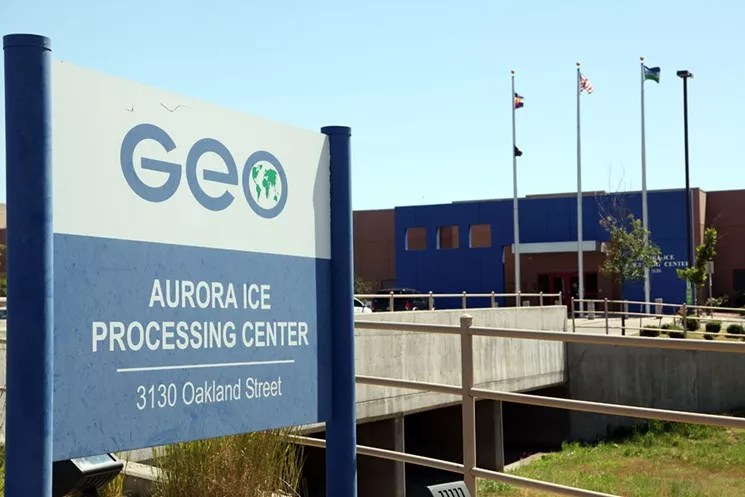
Anthony Camera

Audio By Carbonatix
Immigration and Customs Enforcement detainees housed at the privately run detention facility in Aurora will soon receive the COVID-19 vaccine.
“Tri-County Health Department will begin vaccinating people at the GEO ICE Facility April 8,” says Becky O’Guin, a spokesperson for the Tri-County Health Department. “This is in tandem with vaccinating other eligible groups as well, and has important public-health implications because disease transmission in congregate settings can be difficult to control, as evidenced by prior outbreaks in this facility.”
A total of 185 ICE detainees have tested positive for COVID at the Aurora Contract Detention Facility since the pandemic began. None have tested positive in recent weeks, according to ICE’s website, and there have been zero deaths.
“We applaud ICE for providing access to a vaccine that will at least bring some relief when people are stripped of their liberties so they don’t have to fear they’re going to be stripped of their lives,” says Laura Lunn, a lawyer who represents ICE detainees in Colorado through the Rocky Mountain Immigrant Advocacy Network.
The Aurora facility, which is run by the private prison company GEO Group through a contract with ICE, was the site of an extended outbreak among ICE detainees in the fall of 2020. Prior to the COVID-19 pandemic, the facility also dealt with outbreaks of other infectious diseases, including mumps and chicken pox.
Detainee numbers are way down at the Aurora Contract Detention Facility, which has a maximum capacity of over 1,500. At the beginning of March 2020, just as the COVID pandemic was hitting Colorado, the facility housed 607 ICE detainees. As of mid-March of this year, the facility had 218 ICE detainees.
The ICE detainees in Aurora are a mix of undocumented immigrants without criminal charges or convictions, undocumented immigrants with criminal charges or convictions, legal residents with criminal convictions, and asylum seekers.
The federal government also houses a few dozen U.S. Marshal detainees at the facility in Aurora. According to a report from Congressman Jason Crow’s office, 34 of the U.S. Marshal detainees have tested positive for COVID through the course of the pandemic.
Two ICE staffers and 123 GEO Group employees in Aurora have also tested positive for COVID, though there have been no recent cases.
For much of 2020, immigrant-rights advocates, doctors and lawyers expressed concerns about the COVID threat at the facility, since detainees cannot socially distance from each other when they share space with multiple cellmates. During an October 2020 press conference, Carlos Franco-Paredes, an infectious-disease doctor associated with the University of Colorado Anschutz Medical Campus, said that ICE leadership should release as many detainees as possible, especially ones that were medically vulnerable, because of the dangers of catching the virus. “There’s not really any other way to protect them,” Franco-Paredes said.
John Fabbricatore, director of the ICE Enforcement and Removal Operations Denver Field Office, has told Crow’s office that local ICE officials were able to decrease detainee numbers at the Aurora facility through a combination of humanitarian parole and releasing individuals using alternatives to detention methods.
“It was a life-saving mechanism,” Lunn says of ICE shrinking the population at the Aurora facility. “Had the population been what it was prior to COVID-19, the outcomes would’ve certainly been very, very different. But I also want to make sure we use this as traction to continue. There has been no significant change in our communities other than making sure that we have secured safety for people.”
ICE officials say that they’ve stayed in contact with health departments across the country to make sure that detainees are included in state vaccination plans. Although Colorado health department staffers initially included incarcerated individuals in early phases of the vaccine rollout, Governor Jared Polis overrode those plans and moved most detainees and prisoners to the phase at which the general public would be vaccinated. That phase started on April 2.
“It is disheartening to see that they weren’t prioritized, just knowing the risk factors that were at play,” Lunn says.
GEO Group doesn’t require its employees to be vaccinated. “Staff have been offered vaccine earlier under the health-care worker phase, but we are offering it again,” says O’Guin.